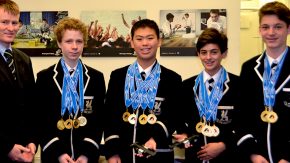Building Healthy Study Habits
I must be honest, I am enjoying the recent drops in temperature that have come as we have moved more fully into autumn. Please don’t get me wrong, I do love summer and all that comes with it, but I do like the natural rhythms of the year and the way things change.
The movement through the annual terms at school is very similar for our boys. Each of the terms have their very different academic character and in the same way I trawl through different drawers of clothing in different seasons, students need different approaches to maintain their momentum in their learning at different points in time.
As we head to the end of Term 1, the boys are moving into their first assessment cycle. Senior boys are about to start examination periods, while boys in other years are working towards a wide range of tasks across their patterns of study. Managing their time, working towards deadlines and preparing for set tasks require a different mindset than those times when the boys are building their foundation knowledge. In conversations with boys at this time, there are some important questions to ask:
- What is on your plate? It is easy to focus on the task, assignment or exam that is the closest in your diary, or for a range of reasons might cause the greatest anxiety? It is important to put that into perspective with the bigger picture by laying out all assessment commitments in the foreseeable future. Sometimes what your son might be most concerned about can distract him in the short term, and exacerbate the pressure he might feel in the long term.
- Can you cut it all up? Successful students, at all stages of their schooling, will tell you how managing their time, allocating it to different tasks and being organised in how they approach preparing for assessments was crucial for them. Talking with your son about what that might look like, and encouraging them to chat with their Mentors is an important first step.
- Are you working smarter, or just harder? Preparing for examinations and tests should not be measured in hours, but evaluated in terms of what boys are doing to give them confidence going into a task. Talk with them about what they do when they study, but more importantly why they do it. Help them to reflect upon how they are spending their time.
- There will always be a place for studying foundation knowledge- understanding terms, essential concepts, the breadth of content in a subject. Reading and summarising is one approach but using flashcards (either old-school bits of cardboard, or any of a range of online or iPad apps), writing sample questions, or designing mind-maps or tables improves retention and increases the effectiveness of the use of time.
- Boys should also ensure they are applying their learning when they study. Past papers or sample tasks, collaboratively working on questions with friends, using the variety of resources they are given are key to finding out what they do (and most importantly don’t) know as they move closer to an assessment.
- What else have you got going on? There is a fine art to avoiding distraction and creating distraction for boys. Time and space for boys to continue with their sport, their social and their family life is essential to give them balance and time away from study in those periods where the pressure can often mount. It helps maintain healthy perspective, but also means that the time spent studying has more impact on them, that they get more value for the time they spend.
- However equally important is how to control distractions. Phones, Facebook and other social media don’t tend to understand study timetables, so talking to boys about how to compartmentalise them helps take pressure off them in the long run.
Students who get the most from their study, and as a result take pressure off themselves, find that they develop habits over the years that work for them. It is easy to get caught in conversation about what boys need to do at these times, not the how. It is a focus on the how, the mechanics of what boys do, that helps to build successful habits.
Mr Trent Driver
Head of Academics / Deputy Head of Stanmore






